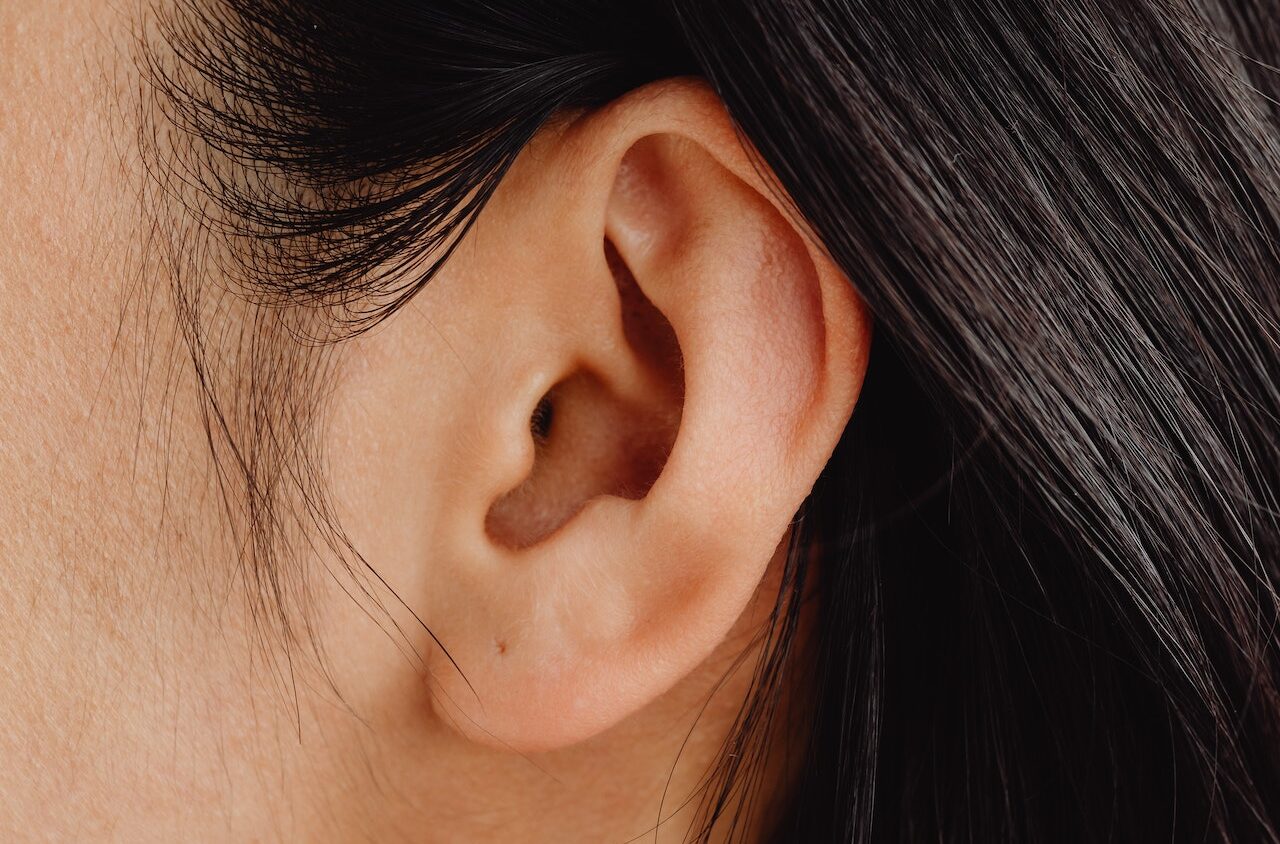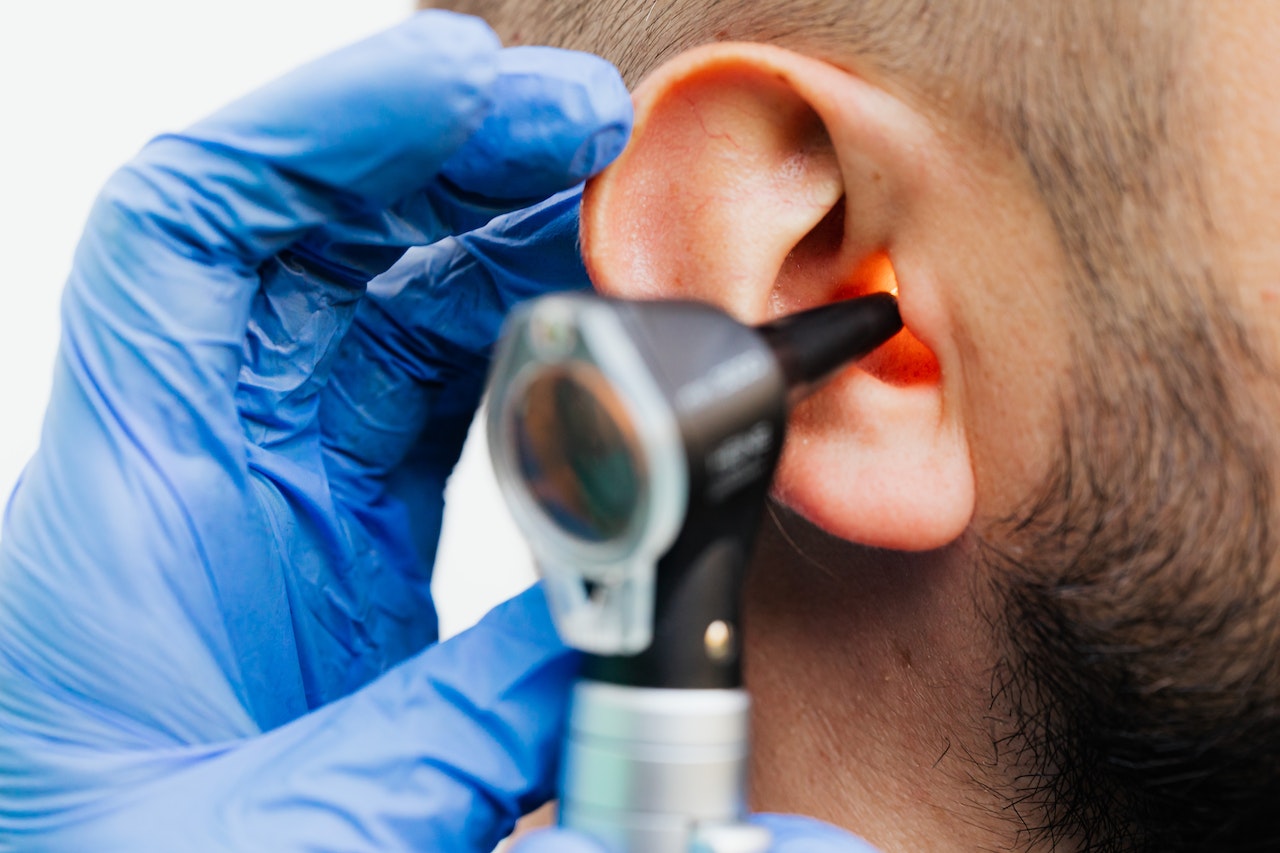Ear infections can be a common and uncomfortable condition that many individuals experience at some point in their lives. Identifying the symptoms of an ear infection is crucial for timely intervention and effective treatment.
In this article, we will explore the typical symptoms associated with ear infections and discuss various treatment options available along with tips to prevent them in the future too. Whether you opt for a remote or in-person private GP appointment, seeking professional medical advice is essential for proper diagnosis and personalised care.

Recognising the Symptoms
Ear Pain
One of the most noticeable symptoms of an ear infection is ear pain, which can range from mild to severe. It may be accompanied by a feeling of pressure or fullness in the affected ear. Ear pain associated with an infection often worsens when lying down, chewing, or swallowing. Changes in pressure within the ear can further aggravate the pain.
Ear Discharge
In some cases, a yellow or white fluid may drain from the affected ear. This discharge can indicate the presence of an infection and should not be ignored.
Types of Ear Discharge
Clear or Watery Discharge – This type of discharge may indicate a viral infection, such as acute otitis media with effusion (OME). It is typically thin and colourless and may persist even after the infection has resolved.
Pus or Yellowish Discharge – If the ear discharge is thick, opaque, and yellowish, it is likely due to a bacterial infection, such as acute otitis media or chronic otitis media. The presence of pus suggests an active infection that requires medical attention.
Bloody Discharge – In some cases, ear infections can cause bloody discharge. This may be a sign of a perforated eardrum or a more severe infection, and it should prompt immediate medical evaluation.
Hearing Loss
Temporary hearing loss or muffled sounds in the affected ear can occur due to fluid buildup or inflammation caused by the infection. This happens most frequently in the middle of the ear, preventing the normal vibration of the eardrum and the movement of the tiny bones (ossicles) responsible for conducting sound. As a result, sounds may be muffled or less audible.
Tinnitus
Some individuals with ear infections may experience tinnitus, which is a ringing or buzzing sound in the affected ear. This sensation can be persistent or intermittent and can be bothersome for some individuals. It’s important to note that tinnitus caused by an ear infection is usually temporary and tends to resolve as the infection clears and the affected structures return to their normal state.
Dizziness or Balance Issues
Dizziness or balance issues can be a significant symptom of an ear infection, particularly when the infection affects the inner ear. The inner ear plays a crucial role in maintaining balance and spatial orientation. When it becomes affected by an infection, it can lead to various balance-related symptoms:
- Vertigo – Vertigo is a specific type of dizziness characterized by a spinning or whirling sensation. It can be intense and may cause a feeling of losing balance or falling. Inner ear infections, such as labyrinthitis or vestibular neuritis, can trigger vertigo symptoms.
- Disequilibrium – Ear infections can disrupt the normal functioning of the vestibular system, which is responsible for sensing changes in head position and movement. This disruption can result in a general sense of unsteadiness or imbalance, making it challenging to maintain proper balance while walking or standing.
- Unsteadiness – Individuals with ear infections may experience a sensation of being unsteady on their feet. They might feel like they are swaying or have difficulty maintaining balance, particularly in situations that require coordination, such as walking in dimly lit areas or navigating uneven surfaces.
- Nausea and Vomiting – Dizziness caused by an ear infection can trigger feelings of nausea or even lead to vomiting in some cases. The combination of dizziness and gastrointestinal symptoms can be quite discomforting.
- Sensitivity to Motion – Those with ear infections may experience heightened sensitivity to certain types of motion, such as quick head movements or riding in vehicles. These motions can exacerbate dizziness and balance problems.

Treatment Options
When it comes to treating ear infections, it is important to consult a healthcare professional for an accurate diagnosis and appropriate treatment recommendations. Here are some common treatment options:
Antibiotics
If the ear infection is bacterial in nature, a course of antibiotics may be prescribed to eliminate the infection. It is crucial to complete the full course of antibiotics as prescribed, even if symptoms improve. We can help diagnose and prescribe the correct antibiotics for your ear infection through our private GP services.
Pain Relief
Over-the-counter pain relievers, such as acetaminophen or ibuprofen, can help alleviate ear pain and reduce the fever associated with the infection. However, it’s worth consulting with a doctor before administering any medication, especially to children.
Warm Compresses
Applying warm compresses to the affected ear can provide temporary relief from pain and help reduce inflammation. Ensure the compress is warm, not hot, and be cautious to avoid burning the skin.
Ear Drops
In some cases, we will recommend medicated ear drops to help alleviate pain, reduce inflammation, and fight the infection directly. There are a few different types we can recommend and prescribe:
Antibiotic Ear Drops – Antibiotic ear drops are commonly prescribed for bacterial ear infections, especially those affecting the outer ear (otitis externa) or middle ear (otitis media). These ear drops contain antibiotics that target the bacteria causing the infection. They help eliminate the infection and reduce inflammation in the affected area.
Steroid Ear Drops – Steroid-containing ear drops are sometimes used to reduce inflammation and alleviate pain associated with ear infections. They can be particularly useful for addressing the inflammation in the ear canal or middle ear.
Analgesic Ear Drops – Analgesic or pain-relieving ear drops may contain ingredients such as benzocaine or lidocaine. These drops help numb the ear canal, providing temporary relief from the pain associated with the ear infection.
Combination Ear Drops – In some cases, ear drops may combine multiple active ingredients to address various aspects of the ear infection. For instance, a combination product might contain both an antibiotic and a steroid to combat infection and reduce inflammation simultaneously.
Ear Examination and Cleaning
During your GP appointment, we will examine your ears using specialized instruments to assess the severity of the infection. We may also clean the ears to remove excess wax or discharge, facilitating faster recovery.
Booking a Remote or In-Person Private GP Appointment
To ensure prompt and appropriate treatment for an ear infection, it is advisable to schedule a remote or in-person private GP appointment. Here are the benefits of seeking professional medical care:
Accurate Diagnosis
We can conduct a thorough examination to accurately diagnose an ear infection and rule out other potential causes of your symptoms.
Personalised Treatment
By consulting with a GP, you gain access to personalised treatment options tailored to your specific condition, medical history, and any unique circumstances you may have.
Expert Advice
GPs have extensive medical knowledge and experience, allowing us to provide expert advice on managing your ear infection and preventing future occurrences. Visit our About Us page to learn more about our doctors at the GAP clinic.
Peace of Mind
Seeking professional medical care ensures peace of mind, knowing that you have taken the necessary steps to address your ear infection and prevent any potential complications.
Prevention Tips for Ear Infections
While some ear infections may be unavoidable, there are steps you can take to reduce the risk of developing them. Consider the following to prevent ear infections:
Maintain Good Hygiene
Keep your ears clean and dry. After swimming or bathing, gently dry your ears with a towel and tilt your head to let any excess water drain out. If you use cotton earbuds, ensure you are only using them to clean the external part of your ears.
Avoid Smoking and Secondhand Smoke
Exposure to cigarette smoke can increase the likelihood of ear infections, especially in children. Quitting smoking or avoiding areas where others smoke can help reduce the risk.
Practice Proper Hand Hygiene
Regularly wash your hands with soap and water or use hand sanitizers to minimize the spread of germs and reduce the chances of upper respiratory infections that can contribute to ear infections.
Avoid Allergens and Irritants
Allergens, such as dust, pollen, and pet dander, can contribute to ear infections. Minimise exposure to these irritants to reduce the risk of developing allergies or respiratory infections that can lead to ear infections.
Manage Environmental Factors
Maintain a clean and allergen-free environment in your home. Regularly clean and vacuum to reduce dust and allergens that can contribute to respiratory infections.
Monitor Swimmers’ Ear (Otitis Externa)
Swimmers’ ear, an infection that occurs due to water remaining in the ear canal, can increase the risk of developing a middle ear infection. Dry your ears thoroughly after swimming and consider using earplugs designed for water activities.
By following these preventive measures, you can reduce the likelihood of developing ear infections and promote better ear health.
Conclusion
Ear infections can cause discomfort and disrupt daily life, but timely diagnosis and appropriate treatment are essential for a swift recovery. If you experience symptoms of an ear infection, such as ear pain, discharge, or hearing loss, it is crucial to consult a healthcare professional.
By booking a remote or in-person private GP appointment, you can receive personalised care, effective treatment, and the peace of mind that comes with expert medical advice. Take control of your ear health and seek professional help to ensure a quick and thorough recovery.
Frequently Asked Questions on Ear Infections
Are ear infections contagious?
Ear infections themselves are not contagious. However, the underlying causes of ear infections, such as viruses or bacteria, can be contagious. This means that the infections that lead to ear infections can spread from person to person.
How to treat ear infections?
Treating an ear infection typically involves addressing the underlying cause, relieving symptoms, and promoting healing. It’s important to note that treatment options may vary depending on the type and severity of the ear infection.
How long does an ear infection last?
The duration of an ear infection can vary depending on the type and severity of the infection, individual factors, and the effectiveness of treatment. In general, most acute ear infections resolve within 1 to 2 weeks. However, it’s important to note that individual experiences can vary.
Do ear infections go away on their own?
In some cases, mild ear infections, particularly those affecting the middle ear, may resolve on their own without specific treatment. However, it’s important to note that not all ear infections will go away without intervention, and some may require medical treatment to prevent complications or promote faster healing.











